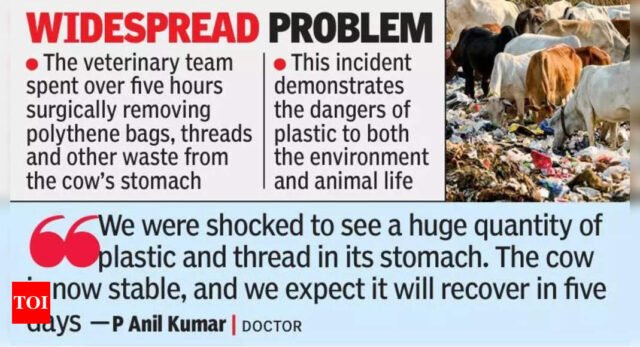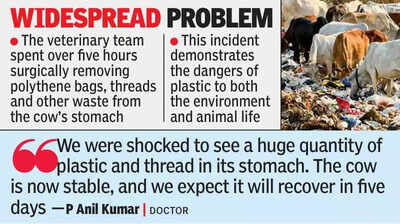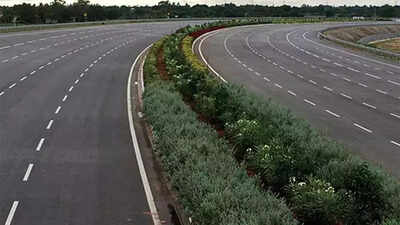Visakhapatnam: A team of medical staff led by Dr P Anil Kumar removed 50 kgs of plastic waste from a six-year-old milking cow at a govt veterinary facility in Visakhapatnam.
The team spent five hours surgically removing undigested polythene bags and threads from the animal, which belonged to a farmer from Anandapuram mandal.
The same medical team had saved another cow by removing a mango kernel from its throat six months ago.
P Narsinga Rao, a farmer from Vellanki village in Anandapuram mandal near Vizag city, brought his cow to the govt veterinary hospital. He said that the animal stopped eating and struggled to lie down for the past few days.
Speaking to TOI, Dr Anil Kumar, who holds a post-graduate degree in veterinary gynecology and obstetrics, explained that the cow displayed open-mouth breathing, indicating respiratory distress due to ‘tucked up abdomen’.
“After clinical observation, we noticed that the cow’s stomach was packed up like a cement bag. We did the rumen atony (Ruminal Stasis or atony means lack of tone or absence of contraction of the rumen) and removed the waste,” the doctor said.
The farmer, who fed the cow both at home and in fields, initially suspected Maida (refined wheat floor) consumption caused the hardened stomach. However, surgery revealed plastic accumulation.
The medical team worked extensively to remove the solidified waste, operating for over five hours. “We were shocked to see a huge quantity of plastic and thread in its stomach. Usually, cow dung becomes hard in the stomach, and we remove it in one hour. But, it was plastic piled up in the stomach. The cow is now stable, and we expect it will recover in five days,” the doctor said.
This case demonstrates the dangers of plastic to both the environment and animal life. The medical team now actively raises awareness about plastic-related risks. “We also decided to use cloth bags or gunny bags and not plastic bags. We will create awareness among the farmers and the general public,” the doctor said.







